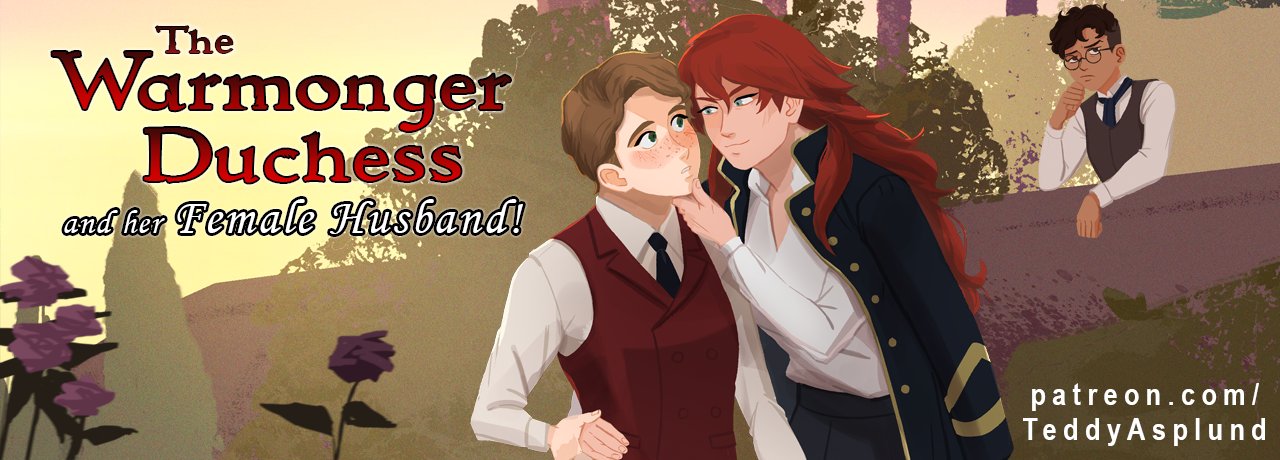
The Viland Empire
1052
Inspiration
Created by
Scope
The motivation behind building The Viland Empire
The Viland Empire exists as the setting for my novel The Warmonger Duchess and Her Female Husband.
The goal of the project
I want to create an interesting and believable world that will support the plot and primary character arcs in my novel.
The Viland Empire's Unique Selling point
Viland is a world of unchanging tradition that's also in constant flux. It's a land of infinite possibility and rigid boundaries. It's a culture that accepts everyone, absorbing each new culture into its own, and yet it's incredibly jingoistic. Everyone there has their own preconceived notions about how the world works, and yet they are largely willing to change their minds—if presented with the right evidence in the right way.
The inherent contradictions are what makes it an interesting space to explore and tell stories in.
Theme
Genre
Secondary-World Medieval Romantic Fantasy, but with low-levels of magic. Directly supernatural elements are primarily limited to the actions of the gods.
Reader Experience
Viland should have the feeling of an ancient powerful empire on the verge of collapse. Viland is a land where politics and violence hold equal weight, and often go hand-in-hand. We enter this world just before the final act of the Shakespeare play, where the hubris of the leader finally goes one step too far, and tragedy becomes inevitable. But Viland is also a world where it's possible to challenge fate, and the inevitable may turn out to be avoidable after all.
Reader Tone
Viland is a semi-realistic down-to-earth world. Depending on your social class and which region you live in, life might be very easy or very difficult for you. In general, the Viland Empire is economically prosperous and not many people go hungry. But it's also an authoritarian state with rigid social classes and no upward mobility, and near-constant civil wars mean that the threat of violent death is never far away. But people still find joy in their lives, regardless.
Recurring Themes
Major Themes Include:
- Politics and social control
- Violence vs Pacifism
- Fate vs Free Will
- Responsibility to Yourself vs Responsibility to Your Community
- Self-Sacrifice vs Self-Preservation
- Self-Expression vs Self-Denial
- Gender, Sexuality, and other Marginalized Identities
Character Agency
The characters in Warmonger Duchess are important political figures with the ability to change the fate of nations—but they're also subject to intense control by laws and gods they cannot simply ignore. They will have to find careful ways around these limitations to truly achieve their goals.
Focus
Government and Legal Systems
Religion and Culture
Gender and Sexuality
- Military
- Trade
- Land Management
Drama
The heir of Earl Gwedric died in an unexpected hunting accident, breaking the engagement contract with Duchess Jordaine. The house of Gwedric has no male relatives close enough to legally substitute for the dead fiance, but if they leave the contract broken, the Duchess will be legally obligated to invade Gwedric and execute the current title-holder.
The Earl's young daughter puts herself up as a possible substitute instead, but the Empire does not legally recognize same-sex marriages.
But because the daughter would legally be taking on the identity of her brother, for legal purposes of the marriage she could arguably be considered a man.
But is this a convincing argument?
Duchess Jordaine is cousin to Emperor Heinrich and the two used to be close; in fact, they were raised together and were nearly inseparable throughout their childhood, and they entered the army together. However, after the Battle of Basnora Pass, the two had a falling out. Jordaine was labeled a coward and a deserter and chased out of the capital and the two have rarely spoken since.
Some time in the past, the Isle of Alborota, a small island nation in the south-west of the Viland Empire, rebelled. The Marqués and his family were killed in the uprising.
A year later, Alborota was retaken and is now ruled by a governor appointed by the Emperor.
The leader of the rebellion, a mysterious bandit known only as the Starling, disappeared during the final battle. No one knows if he still lives, or where he might be if he does.
The Emperor recently declared himself a living god, officially adding himself to the already large pantheon of the Omnic religion. The actual gods are deeply displeased by this and want to see him punished for his hubris.
Duchess Jordaine seems to be making some sort of long term plan to increase her own power and conquer nearby nations, possibly even challenging the emperor himself. But she can't make her movements too obvious too early, or the Empire will crush her. She has to hide her movements until the last possible moment.
Various characters have personal and interpersonal drama, especially around gender and sexuality issues.
Find your way!
Resources
WHO WE ARE
LEGAL
Our Shop
Development
EVENTS
REACHING OUT
A BIG THANK YOU
To all our Our Patrons for their unwavering love and support.
For the amazing images. His Titanship Christopher Dravus of Ironrise Games, Our Revered Deity Basic Dragon / Rin & His Majesty Caeora